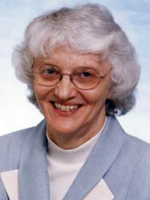
Judith H. Willis, a professor at the University of Georgia, Athens (UGA), was elected as Fellow in 2004. Dr. Willis is internationally recognized for her research on hormonal control of metamorphosis by ecdysteroids and juvenile hormones, which corrected the prevailing paradigm that metamorphic activities were controlled by stage-specific genes.
Willis was born in Detroit, Michigan on 2 January 1935, where she lived until going to college at Cornell University. She received her B.A. in zoology in 1956 and was introduced to the challenges and joy of doing research with insects by Howard Schneiderman. She then went to Harvard University where she received her M.A. in 1957 and Ph.D. in 1961 with Carroll Williams and George Chapman. She married a fellow graduate student, John S. Willis, who, although working in a different field, has been a constant source of support and editorial advice.
Following completion of her Ph.D., she was awarded a U.S. Public Health Services Postdoctoral Research Fellowship to work at Oxford University with Peter Brunet. In 1963, she became an instructor in the Department of Entomology at the University of Illinois, Urbana-Champaign (UIUC), attaining the rank of professor in 1977 and professor emerita in 1991. In 1990, she went to UGA where she became head of the Department of Zoology, and later, professor of cellular biology and adjunct scientist in entomology.
The earlier part of her research career was focused on cuticular proteins (CPs) of the cecropia moth, Hyalophora cecropia (L.). Recently she “metamorphosed,” in her own words, to work on the mosquito Anopheles gambiae Giles. Her lab at UGA has annotated and determined the expression patterns of most of the 233 genes that encode structural CPs in An.gambiae, and she also annotated similar CPs in Drosophila melanogaster Meigen,Apis mellifera L.,andNasonia vitripennis Walker, the subject of her first publication in 1958. Her next objectives are to expand work on CPs in An.gambiae by learning where these proteins are expressed both anatomically and within the cuticle and whether expression can be induced in adult insects.
Dr. Willis has been honored with the Teaching Excellence Award at UIUC in 1966, the Anne and Everett Lee Award for Excellence in Gerontological Education at UGA in 1996, and as fellow of the American Association for the Advancement of Science. She was a Sigma Xi National Lecturer in 1985, and 1987-88. She is a member of the editorial boards of Insect Biochemistry and Molecular Biology and Journal of Insect Physiology, served as a rotator program director at NSF in 1983 and has been on numerous grant and program review panels and university committees. In 2009, a symposium was held in her honor at the ESA Annual Meeting. The Journal of Insect Physiology pays tribute to her in an article in the October 2010 issue and contains papers from the symposium.
Besides being an ardent researcher in molecular entomology, Dr. Willis is also a devoted wife, mentor, respected teacher, enthusiastic traveler, birdwatcher, and a voice for women scientists.
(updated August, 2011)
